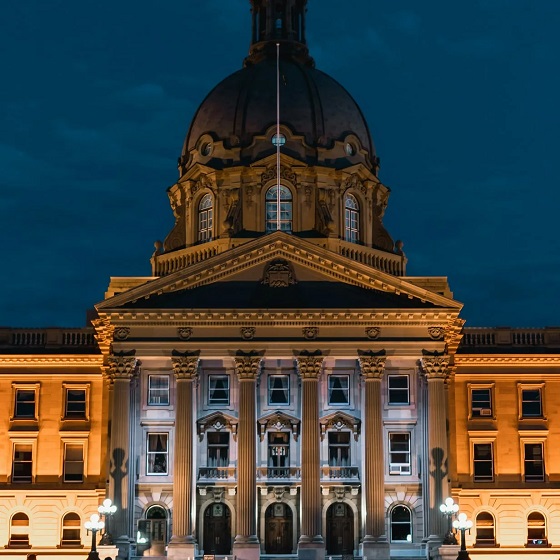Business
Call for Federal Inquiry as Pressure Mounts for Release of Buried Report on Buddhist Land Transactions in PEI

The Great Enlightenment Buddhist Institute Society
The authors of a new book, Canada Under Siege, allege that a religious group linked to the Chinese Communist Party has been involved in a pattern of suspicious land transactions across Prince Edward Island — Canada’s smallest province, which they say is increasingly a flashpoint for questions about national security, land control, and transparency.
The authors — former RCMP superintendent Garry Clement and publisher Dean Baxendale — are pressing for the release of an investigative report they believe was suppressed, and for a new provincial probe commissioned this year to show concrete progress.
As scrutiny from the authors and from media including CBC and The Bureau has increased this year, the long-sought 2018 land-investigation report at the centre of the controversy — prepared by the Island Regulatory and Appeals Commission (IRAC) — may finally surface, after a legislative standing committee issued a subpoena for the document. The report, which examined land holdings on Prince Edward Island, including those of several Buddhist-affiliated entities, was never released publicly by the regulatory body.

The authors, along with a group of concerned PEI citizens were joined in Ottawa yesterday by Wayne Easter, a retired nine-term Liberal MP and former chair of the House Finance Committee. Easter requested a judicial inquiry into suspected corruption tied to land transactions, saying he is among many Prince Edward Islanders alarmed by suspicious dealings involving the Buddhist groups. (The author of this story also spoke at the press conference on PEI investigations and foreign interference.)
Easter stressed that critics do not believe the Buddhist followers who have come to live and work in the communities established by the China-linked organization are engaged in wrongdoing. Rather, he warned that clandestine actors may have infiltrated and exploited the group’s land holdings for undisclosed purposes.
“You need a federal public inquiry that can subpoena witnesses, trace bank accounts,” Easter said.
In response to a CBC report linking the religious group to Chinese Communist Party entities, representatives of the organizations involved strongly denied the allegation, stating that their activities have no political connection to the CCP.
Clement and Baxendale called for a federal inquiry into what they described as land dealings consistent with money laundering, routed through shell companies and religious non-profits.
Adding to those calls, Jan Matejcek, a PEI-based lawyer who has conducted his own investigations with a group of concerned Island residents, says the provincial government’s apparent reluctance to release a prior report into the land dealings of the Great Enlightenment Buddhist Institute Society, conducted from 2015 to 2018, “raises some doubt about this government’s commitment to transparency.”
Documents reviewed by The Bureau show that the decade-old investigation, authorized under section 15 of PEI’s Lands Protection Act, examined land holdings of several Buddhist-affiliated corporations — including the Great Enlightenment Buddhist Institute Society, Great Wisdom Buddhist Institute Inc., Moonlight International Foundation, and related companies — before being declared concluded in January 2018. No findings were ever made public.
A November 2024 letter from Housing Minister Steven Myers, obtained by The Bureau, and addressed to IRAC CEO Doug Clow, is titled “Re: Great Wisdom Buddhist Institute Inc. and Great Enlightenment Buddhist Institute Society.”
In the letter, Myers wrote:
“I am writing to request that the Commission provide an update on the 2018 land investigation file relating to the above-noted organizations. Given the public interest and recent inquiries from legislators, I ask that the Commission provide a summary of its findings and the status of any recommendations or follow-up actions.”
That earlier investigation is now under renewed scrutiny following a February 2025 directive from Myers ordering IRAC to reopen the case under new powers added to the Lands Protection Act in 2022. The minister cited “public interest” and the need to examine potential direct or indirect control of the corporations’ land holdings, requesting a full report on whether the organizations had contravened the Act or its regulations.
This scrutiny follows mounting concern among residents and lawmakers that PEI’s land protections — designed to prevent excessive concentration of farmland — have been undermined by complex corporate structures and opaque beneficial-ownership chains.
The Bureau is a reader-supported publication.
To receive new posts and support my work, consider becoming a free or paid subscriber.
Business
Why Does Canada “Lead” the World in Funding Racist Indoctrination?
Automotive
Canada’s EV Mandate Is Running On Empty

From the Frontier Centre for Public Policy
At what point does Ottawa admit its EV plan isn’t working?
Electric vehicles produce more pollution than the gas-powered cars they’re replacing.
This revelation, emerging from life-cycle and supply chain audits, exposes the false claim behind Ottawa’s more than $50 billion experiment. A Volvo study found that manufacturing an EV generates 70 per cent more emissions than building a comparable conventional vehicle because battery production is energy-intensive and often powered by coal in countries such as China. Depending on the electricity grid, it can take years or never for an EV to offset that initial carbon debt.
Prime Minister Mark Carney paused the federal electric vehicle (EV) mandate for 2026 due to public pressure and corporate failures while keeping the 2030 and 2035 targets. The mandate requires 20 per cent of new vehicles sold in 2026 to be zero-emission, rising to 60 per cent in 2030 and 100 per cent in 2035. Carney inherited this policy crisis but is reluctant to abandon it.
Industry failures and Trump tariffs forced Ottawa’s hand. Northvolt received $240 million in federal subsidies for a Quebec battery plant before filing for bankruptcy. Lion Electric burned through $100 million before announcing layoffs. Arrival, a U.K.-based electric van and bus manufacturer, collapsed entirely. Stellantis and LG Energy Solution extracted $15 billion for Windsor. Volkswagen secured $13 billion for St. Thomas.
The federal government committed more than $50 billion in subsidies and tax credits to prop up Canada’s EV industry. Ottawa defended these payouts as necessary to match the U.S. Inflation Reduction Act, which offers major incentives for EV and battery manufacturing. That is twice Manitoba’s annual operating budget. Every Manitoban could have had a two-year tax holiday with the public money Ottawa wasted on EVs.
Even with incentives, EVs reached only 15 per cent of new vehicle sales in 2024, far short of the mandated levels for 2026 and 2030. When federal subsidies ended in January 2025, sales collapsed to nine per cent, revealing the true level of consumer demand. Dealer lots overflowed with unsold inventory. EV sales also slowed in the U.S. and Europe in 2024, showing that cooling demand is a broader trend.
As economist Friedrich Hayek observed, “The curious task of economics is to demonstrate to men how little they really know about what they imagine they can design.” Politicians and bureaucrats cannot know what millions of Canadians know about their own needs. When federal ministers mandate which vehicles Canadians must buy and which companies deserve billions, they substitute the judgment of a few hundred officials for the collective wisdom of an entire market.
Bureaucrats draft regulations that determine the vehicles Canadians must purchase years from now, as if they can predict technology and consumer preferences better than markets.
Green ideology provided perfect cover. Invoke a climate emergency and fiscal responsibility vanishes. Question more than $50 billion in subsidies and you are labelled a climate denier. Point out the environmental costs of battery production, and you are accused of spreading misinformation.
History repeatedly teaches that central planning always fails. Soviet five-year plans, Venezuela’s resource nationalization and Britain’s industrial policy failures all show the same pattern. Every attempt to run economies from political offices ends in misallocation, waste and outcomes opposite to those promised. Concentrated political power cannot ever match the intelligence of free markets responding to real prices and constraints.
Markets collect information that no central planner can access. Prices signal scarcity and value. Profits and losses reward accuracy and punish error. When governments override these mechanisms with mandates and subsidies, they impair the information system that enables rational economic decisions.
The EV mandate forced a technological shift and failed. Billions in subsidies went to failing companies. Taxpayers absorbed losses while corporations walked away. Workers lost their jobs.
Canada needs a full repeal of the EV mandate and a retreat from PMO planners directing market decisions. The law must be struck, not paused. The contrived 2030 and 2035 targets must be abandoned.
Markets, not cabinet ministers, must determine what technologies Canadians choose.
Marco Navarro-Genie is vice-president of research at the Frontier Centre for Public Policy and co-author, with Barry Cooper, of Canada’s COVID: The Story of a Pandemic Moral Panic (2023).
-

 illegal immigration2 days ago
illegal immigration2 days agoWhile Trump has southern border secure, hundreds of thousands of illegal immigrants still flooding in from Canada
-

 Censorship Industrial Complex2 days ago
Censorship Industrial Complex2 days agoCanadian bishops condemn Liberal ‘hate speech’ proposal that could criminalize quoting Scripture
-

 Energy1 day ago
Energy1 day agoSenate votes to reopen Alaska Coastal Plain to energy leasing
-

 Daily Caller1 day ago
Daily Caller1 day agoTrump Orders Review Of Why U.S. Childhood Vaccination Schedule Has More Shots Than Peer Countries
-

 Alberta1 day ago
Alberta1 day agoA Memorandum of Understanding that no Canadian can understand
-

 Censorship Industrial Complex1 day ago
Censorship Industrial Complex1 day agoFrances Widdowson’s Arrest Should Alarm Every Canadian
-

 COVID-192 days ago
COVID-192 days agoCanadian Health Department funds study to determine effects of COVID lockdowns on children
-

 Automotive12 hours ago
Automotive12 hours agoCanada’s EV Mandate Is Running On Empty
















